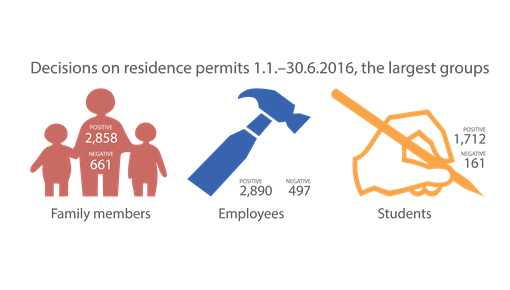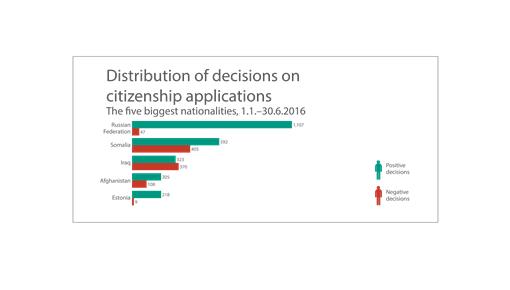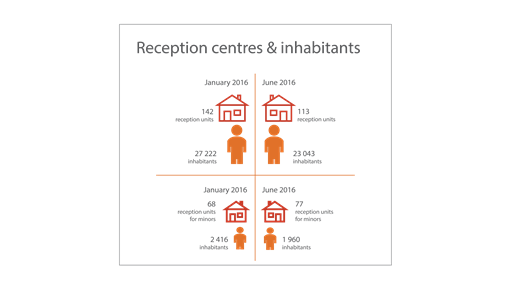Increase in applications for residence permits for studies, the number of other applications is about the same as before
Beginning of year 2016 for the Finnish Immigration Service:
A total of 12,153 foreign nationals applied for a first residence permit in Finland in January–June 2016. Most applications came from familiar nationalities: Russians, Chinese, Ukrainians, Indians and Vietnamese.
Family ties were the reason for the largest share of the applications: 4,958 persons wanted to come live with their family member in Finland. In total, 3,523 persons applied for a residence permit based on employment. In both groups, the number of applications remained at the same level as the previous year.
There was an increase in applications submitted mainly by family members of persons who have been granted international protection. At the beginning of the year, there were 572 such applications. At the beginning of the previous year, 306 persons applied for a residence permit on the same grounds. Therefore, the relative growth was considerable (87 per cent) but the number of applications in this group still remained lower than the number of applications of family members of Finnish citizens (1,426) and other foreign nationals (2,960).
The largest increase at the beginning of the year was seen in students’ residence permit applications with 3,079 submitted applications, which is approximately 35 per cent more than during the first half of 2015 (2,282).
“The increase was probably influenced by the fact that educational institutions in Finland will implement tuition fees for foreign students as of 2017. So this is the last chance for foreign students to apply for free education,” estimates Anna Lindström, Head of the Student Team at the Finnish Immigration Service estimates.
The possibility to apply for a residence permit as an Ingrian returnee ended 4 July 2016. Many people submitted their application at the last minute which led to a fivefold increase in the applications compared to last year (1–6/2015: 77, 1–6/2016: 403).
At the beginning of the year, 9,150 decisions on residence permits were made and 84 per cent of them were positive. The share of positive and negative decisions varies a great deal in the different application groups.

More interest in citizenship, more negative decision than before
At the beginning of the year, 6,009 persons applied for Finnish citizenship which is almost as many as during the same period last year (1–6/2015: 6,053). Most applications for citizenship were submitted by Russians, Somalis, Iraqis, Estonians and Afghans.
A total of 6,703 persons received a decision on citizenship. Of the decisions, 78 per cent were positive and 22 per cent negative. The share of negative decisions increased compared to the previous year, when 14 per cent of the decisions were negative.
“The most common reason for a negative decision is either insufficient language skills or an unclear identity,” says Ulla Vainikka, Head of Section at the Nationality Unit of the Finnish Immigration Service.

Number of asylum seekers has stabilised, stricter guidelines introduced
From January to June, 3,322 persons applied for asylum in Finland. This is an increase of 26 per cent compared to the same time last year (2,642). However, compared to last autumn and winter the number of applicants has decreased significantly because during the end of 2015 about 30,000 asylum seekers arrived – now the number is only a tenth of that.
“The number of asylum seekers usually increases at the end of the year, but a sudden increase like the one we saw last year is unlikely. The reasons for this are, above all, the EU-Turkey Agreement and the border controls in Central Europe and the Nordic countries. The number of applicants will probably not exceed the Ministry of the Interior’s estimate of 10,000 applicants this year,” says Esko Repo, Director of the Asylum Unit at the Finnish Immigration Service.
From January to June, 12,341 asylum seekers received their decision. The share of negative decisions increased in May and June. The reason for this was the removal of humanitarian protection from the Aliens Act on 16 May. At the time of the amendment to the Act, the Finnish Immigration Service updated its country guidelines for Iraq, Afghanistan and Somalia and found that the security situation in these countries of origin has improved and that their citizens cannot be granted international protection based solely on their place of residence.
Humanitarian protection was a category of residence permits granted solely based on the security situation in a person’s place of residence. At present, there are two categories of international protection left in the Aliens Act: asylum (refugee status) and subsidiary protection. Both categories require individual grounds for the risk of facing persecution or serious harm.

Decreased accommodation capacity, compilation of readiness plans
At the beginning of January, there were 210 reception centres in Finland with about 30,000 inhabitants. Six months later, the number of reception centres has been reduced as the number of asylum seekers has decreased: now there are 190 centres with about 25,000 inhabitants. By the end of the year, more centres will be closed and the accommodation capacity will be reduced as necessary.
Every region of Continental Finland now has and will have reception centres at the end of the year. Approximately 10 per cent of asylum seekers live in private accommodation outside the reception centres.
The Finnish Immigration Service has prepared itself for a sudden increase in the number of asylum seekers, even though this seems unlikely at present. We are constantly following and evaluating the development of the situation. The authorities have the readiness to establish registration centres in different places throughout Finland within a couple of days. Asylum seekers are registered at these centres.
“The number of beds at the reception centres can quickly be increased by thousands and emergency accommodation can be established for ten thousands of people if necessary,” says Pekka Nuutinen, Head of Development at the Reception Unit of the Finnish Immigration Service.

Further information for the media
Press and Communications Services, Finnish Immigration Service: tel. +358 295 433 037, e-mail: media@migri.fi


